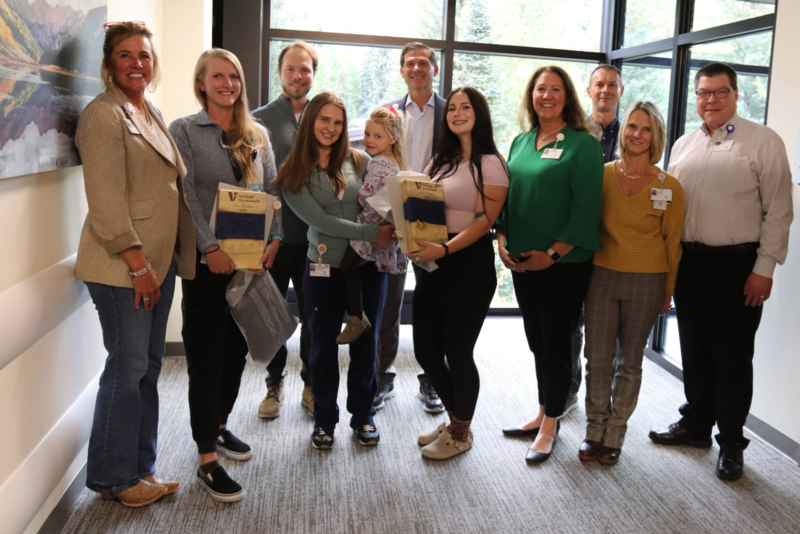News
Coronavirus updates: Eagle County up to 4 confirmed cases as state total rises to 33

This article was first published in the Vail Daily on March 11, 2020.
The state of Colorado announced 16 more presumptive positive cases of COVID-19 on Wednesday, including another in Eagle County. The Eagle County patient was identified as a man in his 70s. Nine of the 16 cases were from Pitkin County.
In a release issued Wednesday, Eagle County Public Health and Environment said as the virus continues to spread in the community, the department will likely implement guidance to reduce events and large gatherings, as well as recommendations to help better protect people that may be a greater risk for severe disease.
“The likelihood of community transmission is already relatively high given the level of illness showing up in our medical clinics and the amount of COVID-19 testing being conducted,” said Heath Harmon, Director of Eagle County Public Health and Environment. “Many of our test results are still pending. Once this information is available, it will provide a more clear picture of local transmission, which in turn will further inform guidance and precautions for our community.”
The Colorado Department of Public Health and Environment said Wednesday that it has no reason to suspect we are seeing limited community spread in Colorado based on the information the department is receiving from presumptive positive cases.
While Eagle County’s first two patients were confirmed to have a recent travel history, the two most recent cases are still under investigation.
Eagle County Public Health and Environment said it is continuing to monitor and look for cases where there was no travel or no known contact with a person diagnosed with COVID-19. This may indicate that transmission is occurring locally, which could further change future guidance and recommendations.
In the meantime, local health officials are establishing and communicating guidance for events that bring people in close contact with one another that could increase the spread of COVID-19 in the community. According to those guidelines:
At-risk populations are chief concern
People aged 60 years and older and people that have underlying health conditions should consider staying away from large groups of people where they would be in close contact with others and where exposures to coronavirus are more likely and harder to control. These include social events, concert and theater venues, conferences, and other events where it is impossible to maintain physical space between yourself and others. People at higher risk for severe disease should talk to their medical provider for additional guidance that may be more specific to their medical needs.
Event and community gathering considerations
If you can feasibly avoid bringing large groups of people together, consider postponing events and gatherings.
Urge anyone who is sick to not attend.
Encourage those who are at higher risk for coronavirus to not attend.
Try to find ways to give people more physical space so that they aren’t in close contact as much as possible.
Encourage attendees to maintain healthy habits, such as frequent hand washing. Providing supplies like tissues and hand sanitizers may help further promote these preventive habits.
Clean surfaces with standard cleaners.
Should I cancel my event?
There are several considerations that event organizers should make when answering this question. The bottom line is that prolonged events where large numbers of people are in close contact with one another can increase the likelihood of spread.
- Consider the importance of the event and whether it needs to be held now or can be rescheduled or canceled. We suggest that events that can wait are held at a later date.
- Consider the population that is likely to attend. If you are hosting an at-risk population, we suggest you err on the side of caution and hold the event at a later date.
- Begin your communication now with participants, guests, ticket-holders, even if a final decision has not been made yet. Make them aware that we want to host healthy and safe events.
- Communicate that the impacts of COVID-19 are being felt in communities across the world, including ours.
- Consider options if the participant wishes to cancel their attendance and provide further guidance
Eagle County Public Health is not currently recommending closing schools. School officials have been in close contact with ECPHE to discuss plans and procedures that help promote a healthy school environment for children, youth and adults. There are many reasons why schools are viewed differently than the large public gatherings outlined above:
- Children and youth have not been shown to be a high-risk group for serious illness from this virus.
- Protocols for increased cleaning within schools, as well as monitoring of illness, and procedures for when to exclude children and youth are already in place.
- When some schools briefly closed during the H1N1 influenza pandemic, we learned that many children still gathered in group settings elsewhere in environments without the controls outlined above.
- As many as 40% of children and youth at Eagle County Schools qualify for free and reduced lunch. If schools were closed, a key source of daily nutrition for many families would be cut off.
- School closures would also have a significant impact on the local workforce. Although this would impact all employers, reducing the availability of medical staff is of great concern and would be counter to what our community needs right now.
- As much as possible, children should be allowed to carry on with their education and normal activities.
- Some children have underlying health conditions, such as weakened immune systems, that put them at higher risk. Caregivers of children with underlying health conditions should consult with health care providers about whether their children should stay home.
- “We understand the impact of this guidance on our residents, our businesses, and our communities,” said Harmon. “We don’t take these decisions lightly. We know how this disease spreads in the community and what preventive measures can help slow it down and help prevent exposures to people at greatest risk.”
In January, Eagle County established a specific COVID-19 community-wide task force that began meeting weekly to plan and prepare for the arrival of COVID-19 in the community. On March 1, the task force began meeting daily.
Internally, within the Vail Health health care system, which includes Colorado Mountain Medical, a task force was created in January to further plan and prepare for COVID-19 with the guiding principles of the safety and wellness of the staff, the safety of and service to patients, and maintaining daily operations, including emergency services. The internal task force includes two epidemiologists.
The county and health care providers began taking a proactive approach to testing for COVID-19 to help with early tracking and controlling throughout the community. As of March 11, there have been more than 75 individuals tested for COVID-19.
On March 6, prior to the first presumptive positive case of COVID-19 in Eagle County, Vail Health and Colorado Mountain Medical established the first dedicated screening and testing facility in Colorado. The drive-up facility is by appointment only and serves all primary care providers in the Eagle River Valley.
On that same date, in an effort to proactively protect staff and patients, Vail Health Hospital began pre-screening patients and visitors to Vail Health Hospital for symptoms of COVID-19. On March 11, a visitor policy was implemented to reduce the amount of foot traffic through the facility.
On March 11, Vail Health and Colorado Mountain Medical established a designated respiratory clinic at Vail Urgent Care, which focuses on non-emergency patients with respiratory symptoms. The clinic, which is open during the same operating hours of the seven-day-a-week urgent care, is by appointment through primary care physicians. To schedule an appointment, call (970) 926-6340.
More News
-
New!
More

First Chair to Last Call: What Does Alcohol Really Mean For Your Health?
In nearly every Colorado ski town, some iteration of the neon sign blares its play-hard-party-harder anthem. It’s a not-so-subtle nod to mountain party culture, a lifestyle that normalizes combining sports and outdoor adventures with heavy drinking and partying. In Eagle County, après culture, high-altitude living and outdoor performance have coexisted for as long as locals have been sliding on snow. But how much is too much at altitude? And what role do social support systems play in helping residents find balance?
-
New!
More

Counting More Than Steps: How Wearables Can Help (or Hinder) Your Health
From step counts to sleep stages, heart rate variability to blood sugar spikes, wearable devices are giving us a front-row seat to what’s happening inside our bodies. Strapped to wrists, slipped onto fingers or wrapped around our biceps, wearables like the Oura Ring or Whoop strap promise insight and advice in the quest for better health.
-
More

Cass Barham and Sarah Crabtree Honored As Recipients of Vail Health Elevate Award
Cass Barham and Sarah Crabtree, both lab techs at Vail Health Hospital, have been named recipients of the Vail Health Elevate Award. Vail Health created the Elevate Award in June 2022 to give patients and their families an opportunity to nominate and thank employees who have touched their lives in some way.
